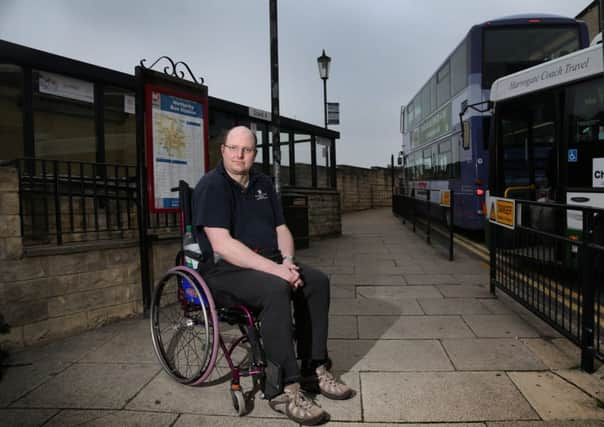Bus company wins wheelchair case appeal


The “proper remedy” for wheelchair users to get improvements in such cases is to ask parliament, three judges decided yesterday.
The judges had been asked to give a ruling following a woman’s refusal to move a pushchair with a sleeping baby from a bay on a bus used by wheelchair passengers.
Advertisement
Hide AdAdvertisement
Hide AdLady Justice Arden, sitting with Lord Justice Lewison and Lord Justice Underhill, unanimously allowed an appeal by First Group, which had been ordered to pay £5,500 damages to wheelchair user Doug Paulley, 36, from West Yorkshire.
Mr Paulley was denied access to a bus in February 2012 after the woman with the sleeping baby refused to move.
A judge at Leeds County Court ruled First Group was in breach of its duty under the Equality Act 2010 to make reasonable adjustments for disabled people.
Recorder Paul Isaacs declared the company should have taken measures to ensure Mr Paulley was not at a disadvantage when he tried to get on the bus.
CONNECT WITH THE SCOTSMAN
• Subscribe to our daily newsletter (requires registration) and get the latest news, sport and business headlines delivered to your inbox every morning
Disagreeing, Lord Justice Lewison said: “The judge seems to me to have thought that the needs of wheelchair users trumped all other considerations. If that is what he meant, I respectfully disagree.”
Lady Justice Arden said: “It follows from the judgments of this court that the proper remedy for wheelchair users is to ask parliament to strengthen the powers of bus drivers so that they could, for instance, require people to vacate the wheelchair space, or create new duties on other passengers, or to campaign for a different design of buses.
“In that way, a greater number of wheelchair users would be able to use the wheelchair space.”
Advertisement
Hide AdAdvertisement
Hide AdThe judge said she did not underestimate the difficulties of travel for wheelchair users “or their frustration at the pace of change”.
She added: “It is obvious that, as one wheelchair user has said, for them the world was not built with a ramp.”
However, the only question the court had to answer was whether it would be reasonable for the First Group bus company to have to adopt the policy in favour of wheelchair users proposed by Mr Paulley.
The judge said the answer to that question “in the current circumstances is no”.
Campaigners for young disabled people said the ruling “can only worsen the situation, particularly for those in rural areas who may heavily rely on bus services”.
Victoria Wright, speaking for the Muscular Dystrophy Campaign Trailblazers, a network of young disabled people, said: “We are frustrated and extremely disappointed by this decision, which means that wheelchair users do not have priority, in law, over wheelchair spaces on those buses that they are actually able to board.
“Travelling by public transport with a young child and buggy can be difficult and stressful – as a mother myself I am all too aware of this. However, many disabled people already find themselves unable to rely on public transport to commute to work, get to school or college or to travel to vital appointments like hospital visits.”
SCOTSMAN TABLET AND IPHONE APPS